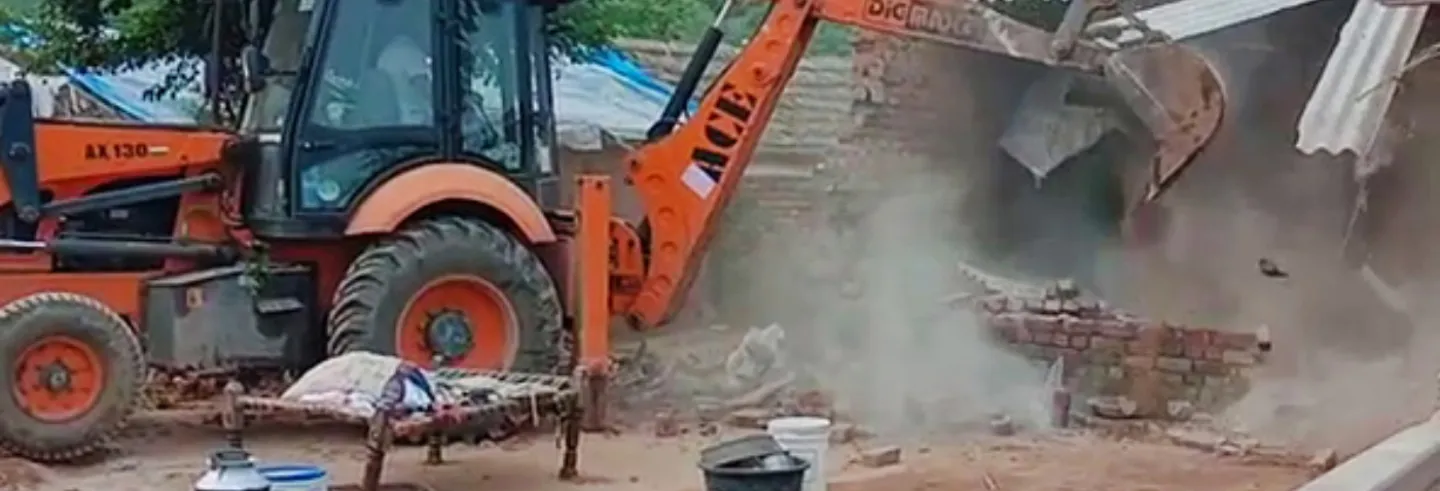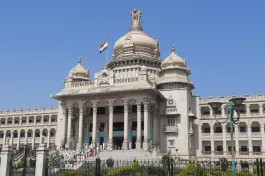A Hindu-Muslim clash occurred in a poor neighbourhood. Delayed state intervention to restore public order followed, on the presumption that one community, the Muslims, were in the wrong. Ferocious state-backed measures came next, to 'send a message' and calm frayed tempers, which uncannily left only one community, the Muslims, worse for wear.
It did not matter that the persons concerned were part of the demographic majority and had been living there for ages. Their very existence in that area, the state now claimed, was illegal, thus reemphasising an existential presumption of guilt. So much so that two judges of the Punjab and Haryana High Court were forced to question whether the state’s conduct was suggestive of “ethnic cleansing.”
The violence in Nuh in July and early August 2023 reenacted what has become a template in today’s modern, muscular, and maddeningly impatient Indian state. It is a template that was not suddenly drafted, but has gradually emerged through the pages of post-independent India’s history, whether we wish to acknowledge it or not.
In extolling the rule of law to criticise state action, are we being led down a garden path that takes us to a far darker destination?
There is no time for notice, hearing, deliberation, or procedures in this era of 10-minute grocery deliveries. The only form of justice is the quickest, consequences be damned. Commentators are certainly right to be alarmed at what are increasingly regular departures from conventional ideas of a rule of law-based society.
But there is a catch. In extolling the rule of law to criticise state action, are we being led down a garden path that takes us to a far darker destination?
To be absolutely clear, I am not for a moment suggesting that there is no such thing as the rule of law, or that the rule of law is some colonial imposition (for more, see here).
My query is different. If the laws responsible for propping up our rule of law might permit the same outcomes that were caused by ignoring them, is this variant of the rule of law something to defend or decry?
Bulldozers in the mix
State-sponsored demolitions of lives on the pretext of their spatial illegality – unauthorised or illegal constructions, in other words – became a common aspect of the pursuit of urban modernity by cities in the 20th century. Clean, orderly, and healthy cityscapes of an imperial regime were juxtaposed with the disorderly living of the natives, and saw efforts to remodel the colony in the image of the metropole. In India, the reconstruction efforts in Bombay at the turn of the 20th century and the construction of New Delhi are good examples (see here and here for a brief history).
The legal approach to these urbanisation efforts by the British was first to determine what kind of living was acceptable in what parts of the city and set standards of what could qualify as acceptable living in the city. The second step was to deem departures from these standards as 'illegal' and, in some cases, offer alternative accommodation to the people at threat of being displaced. The third, and final step, was to raze the illegal existences to the ground.
The determination of what is legal and illegal, and then carrying out the task of removing the illegal from existence was left to the executive and its representatives on planning bodies. Persons aggrieved by these choices could go to the courts, but not to question the fundamental line-drawing – they could only challenge its implementation through demolition.
This legal regime, as well as the aspiration of urbanisation and modernity, was adopted lock, stock and barrel by independent India’s legislators and administrators. It was given renewed impetus by Parliament with the creation of statutory regimes for building a planned and urban Delhi.
Aggrieved persons had to be given a chance to be heard and also had limited rights of appeal, but nothing close to a full judicial review of the executive action was permitted.
The Delhi Development Act and Delhi Municipal Corporation Act, both passed in 1957, reiterated the colonial strategy of empowering executive officials to do the line-drawing exercise of defining legality in city life and bestowing on them the means to enforce their choices through demolitions. Aggrieved persons had to be given a chance to be heard and also had limited rights of appeal, but nothing close to a full judicial review of the executive action was permitted.
What was good for Delhi was soon seen as good for the rest of India. Similar statutes proliferated across the country over time, such as the Haryana Urban Development Authority Act of 1977 and Haryana Municipal Corporation Act of 1994, which define the “entire procedure” that the authorities claim they followed while razing structures in Nuh (according to reported claims in court).
Section 88 of the 1977 act and Section 261 of the 1994 act both permit the demolition of structures that are classified as “illegal” – either on account of being built contrary to plan or being built on government land – by following a simple formula. First, prior to any order of demolition being passed, there must be an opportunity of being heard. Second, prior to demolition being carried out, there must be a notice served upon the person, specifying when the demolition is planned, with a certain time frame specified in the law. Third, an appeal against any order or notice can be preferred, but only to specified executive authorities. Finally, the decision of the appellate authority is final and binding.
There are several critical questions that arise if we read these simple mandates closely. What is the kind of opportunity to be heard that must be offered – do I get a formal notice to appear? Must the state positively prove that it gave me this opportunity, or must I prove that it did not? Must the state offer reasons why my explanations were insufficient at this hearing?
Similarly, in respect of the notice before a demolition, on whom does the burden lie to prove that notice was actually issued? Must the state show a notice with a date of receipt, or must I show the absence thereof?
Where we may think that a statute in a republican democracy protecting fundamental rights by way of a written Constitution would give the benefit of doubt to citizens and require the state to bear these burdens, the statutes do no such thing. Instead, they presume – a thriving legacy of colonial laws – that any acts undertaken by officials have been in compliance with the law and also in good faith. Not only is the burden squarely placed on the hapless citizen facing the demolition, the laws also offer express protections to officials against any legal proceedings alleging the improper exercise of power.
An ideal worth defending?
That even these limited procedural guarantees are sought to be flouted by the state in carrying out demolitions speaks volumes about the maddening impatience I referred to above. Or, as has been argued, it suggests there is no justification under urbanisation laws for the demolitions, which are nothing but a proxy for pursuing a discriminatory agenda against religious minorities. Ergo, following the rule of law would have avoided such an outcome.
This is an argument that I have found difficult to accept.
First, as the previous section should make clear, the so-called protection of the rule of law in these statutes is very sparse. It is merely a fig leaf in the way of a bulldozer being summoned by the state. Going to court becomes little more than a fait accompli, except in the most egregious of cases.
Considering the multi-axis nature of marginalisation—people are not just poor but are often also marginalised on account of being minorities—the implementation of urbanisation laws provides a wonderful foil to pursue religious discrimination over time.
Second, and more importantly, the very structure of urbanisation laws pursues a discriminatory agenda by design.
The anti-poor implementation of such muscular laws is no secret (see general critiques here and here) and there have been studies documenting how the marginalised are pushed out of the narrative unless they have sufficient political capital to either avoid the bulldozer or obtain the elusive regularisation of their living space. Considering the multi-axis nature of marginalisation – people are not marginalised just because of poverty but are often also marginalised on account of being minorities – the implementation of urbanisation laws provides a perfect foil to pursue religious discrimination over time.
Delhi itself is a vivid reminder of this historical process. In this fashion, while on the face of it urbanisation laws are concerned with demarcating spatial illegality, they become tools to carry out a much more sinister kind of demarcation, between 'them' and 'us'.
The legal procedures around demolitions are, I would argue, not a reflection of a rule of law regime with some idea of justice worth defending. Rather, they are but a clever sleight of hand masking a rule by law, one which does little to stand in the way of pursuing whatever outcomes the state deems fit.
This is not a small point of distinction – it is germinal.
Rule of law is what engenders laws with fairness and encourages a sense of political obligation within persons. Rule by law is the backbone of an apartheid state which demands fealty with its law through fear of sanction.
A closer look at the panoply of laws across India would reveal that large parts of the legal savannah are replete with such rule by law statutes. Across almost all areas of individual life which require interaction with the state, the structure of our laws is built upon conferring wide powers upon the executive to carry out the will of the state, and not to render the state and its actors accountable to the will of the people who gave to themselves the Constitution.
Till we recognise and dismantle these legal structures, the bulldozers will not stop coming.
Abhinav Sekhri is a lawyer practising in New Delhi. When not working or writing about criminal law, he can be found trawling through the archives in search of curious stories from Indian legal history.









